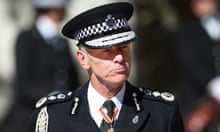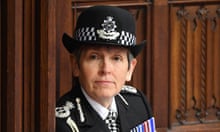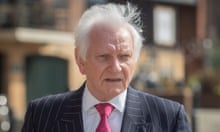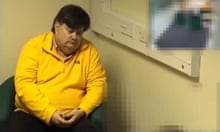The end of Scotland Yard’s high-profile investigation into claims of a murderous Westminster paedophile ring puts the Metropolitan police under scrutiny over their methods and raises new questions about the pressure MPs exert during criminal inquiries.
Senior officers will be asked to explain why it took 16 months to conclude there was no corroborative evidence to support lurid, horrific and, for some, extraordinary murder allegations from a single witness.
Despite three alleged murders, the investigation, called Operation Midland, has not identified or found a single body or led to any charges.
The force’s approach was forged by the experience of the Jimmy Savile scandal, and the subsequent Operation Yewtree inquiry. During that investigation, hundreds of witnesses came forward after a high-profile press conference to corroborate each other’s accounts of sexual exploitation and rape that had been unspoken for decades.
At the centre of Operation Midland was the complainant, Nick, a pseudonym to hide his real identity. A father in his 40s, Nick has held a long-term job and positions of responsibility in his community.
Nick had written of abuse by his stepfather and a group of men, and attracted the attention of individuals who work to support victims of child abuse. Through them he was contacted by a journalist from the website ExaroNews, made up of a small group of investigative reporters based in Fleet Street. Using Nick as a source they sold stories in the summer of 2014 about the alleged Westminster paedophile ring to tabloid newspapers. Nick also met the MP Tom Watson.
Detectives contacted Exaro and, unusually, Nick was accompanied by a journalist from the website when he was interviewed by officers. From the start, the police were conscious of media involvement in the inquiry.
Nick gave a detailed account of sexual abuse and murder. He said he was first physically and sexually abused by his stepfather, a military figure who eventually passed him round to other figures of authority from 1975, when he was seven, to 1984.
He named 12 members of a ring of powerful abusers. They included Harvey Proctor, the former home secretary Leon Brittan, the former prime minister Sir Edward Heath and the former chief of defence staff Lord Bramall. Another former army general was also implicated along with the former heads of MI5 and MI6.
The abuse took place, Nick claimed, at an apartment block called Dolphin Square, a short walk from parliament, and other locations around London, including the Carlton Club and at venues in the home counties, including military facilities.
The most startling claim was that the gang murdered three boys – two were allegedly killed for sexual pleasure and another run over by a car to keep other abuse victims in a state of terror.
According to Proctor’s solicitors, Nick told police he watched Proctor repeatedly stab a restrained 12-year-old boy for 40 minutes before strangling him to death.
On another occasion, the solicitors were told that Nick had said he was raped by Proctor, who he said planned to cut off his genitals with a penknife but was stopped from doing so by Heath. Nick claimed to have been handed the penknife by Proctor as a memento.
Before apparently trying to test or corroborate any of the allegations, the Met held a press conference in December 2014 during which the lead officer, DS Kenny McDonald, told journalists that Nick had been interviewed by experienced officers from murder investigations and that they believed his account. “They and I believe what Nick is saying is credible and true,” he said.
It was a statement for which the Met has been heavily criticised – including by some of its own officers – and which it later had to retract.
Officers hoped that employing similar tactics to Operation Yewtree – reassuring victims they would be believed and making high-profile appeals for information – would bring new witnesses forward.
“You don’t have forensics, you don’t have cell site evidence in these kinds of inquires. What you are looking for is other witnesses who are giving similar accounts,” said a senior police source.

But witnesses and other victims were not forthcoming, unlike in the cases of Savile, and others. In the meantime, there had been much speculation across social media over the identity of the alleged paedophiles.
In March, detectives raided Proctor’s home near Grantham, Lincolnshire. The former MP for Billericay had stood down from his seat in 1987 because he was charged, and later found guilty, of indecent behaviour with men aged between 17 and 21 – a charge that could not be made today because the age of consent for same-sex relationships is now 16. Since then, Proctor had been living anonymously with his partner away from the public eye.
When more than a dozen officers raided his home, confirming the first named suspect in the inquiry, Proctor was once again thrust into the spotlight – this time as a suspected paedophile and murderer. Proctor said that after the overwhelming publicity that followed, he had to leave his job as private secretary to the Duke of Rutland. The police, he claimed, had deliberately ensured that the raid would be leaked to the media to generate further publicity.
“Exaro journalists knew of the search of my house before the police left it – one of them called me, with devastating consequences for my life. The MPS [Met] know the type of statements they release do identify innocent people by ‘context’ that they themselves give,” he said.
In a letter to Proctor, the Met denied disclosing his identity to the media. Brittan, who died of cancer in January 2015 aged 75, had been interviewed over a separate rape allegation. He died not knowing that police had concluded he had no case to answer four months earlier.
But six weeks after his death, his widow, Diana, looked on as police raided his central London home over Nick’s claims. A close friend of the family said she was not told the reason for the raid as officers took away computers, papers and hard drives, some of which belonged to her. They have not yet been returned.
Officers also raided the home of Bramall, 92, a war hero who took part in the Normandy landings and whose wife was in the last stages of dementia.
Both Proctor and Bramall were interviewed under caution but never arrested.
Senior police sources have defended the searches and the use of a number of officers. “What you are looking for is indicative behaviour, images of child abuse on a computer for example, or letters or documents linking a suspect to a complainant. We use lots of officers in order to get searches done efficiently and swiftly.”
But nothing was found in any searches to corroborate Nick’s allegations.
In August 2015, Proctor said he had had enough and held an explosive press conference at which he outlined Nick’s claims, as told to him by the police, placing them in detail in public for the first time. He also named his fellow accused and ridiculed the suggestion that he and Heath had ever socialised with each other.
In September, the Met admitted that it should never have stated Nick’s claims were true. Within weeks, McDonald was taken off the inquiry.
Bramall was told by Scotland Yard in January that he would face no further action. He, like Proctor, wants Nick investigated for wasting police time, but there is no will within the Met police to pursue the complainant, whose account of abuse touched them, and who came across as a credible witness.
Bramall, Proctor and the family of Brittan have all expressed their exasperation at the failure of detectives to test Nick’s claims. For example, Bramall, who was head of the British army when the alleged abuse took place, said that no one had bothered to speak to his personal assistant during their inquiries; Lady Brittan, a former magistrate, was not asked about whether she could account for her husband’s movements on specific days.
But police are understood not to have been given specific dates of when the abuse took place. The senior source said complainants of non-recent child abuse found it extremely hard to pin down times and dates due to their age, the time that had passed and the trauma they might have suffered.
The role of politicians, including Tom Watson and the London mayoral candidate Zac Goldsmith will now be under renewed scrutiny. Watson, the Guardian understands from a source involved at the beginning of the inquiry, met Nick very early on. Both politicans have been accused of abusing their positions to influence the police inquiries and cast aspersions upon alleged abusers.
Goldsmith has declined to withdraw allegations that Brittan was an abuser, which he made in the Commons in November 2014 under parliamentary privilege. At the time a spokesperson for Goldsmith said: “In his speech to parliament Zac rightly pointed out that allegations of historic[al] child sex abuse should be taken seriously and investigated appropriately – this is why he welcomes and supports the Goddard inquiry.”
Justice Lowell Goddard is leading an independent inquiry examining how public bodies handled their duty of care to protect children from historical abuse in England and Wales.
Watson, who first made claims of a Westminster paedophile ring in
parliament in 2012, has since apologised to Lady Brittan in a
handwritten letter for any distress made by his claims that Lord
Brittan was “close to evil”.
Simon Danczuk, the MP for Rochdale who uncovered many of the abuse claims against Cyril Smith, was one of seven MPs who in June 2014 signed a letter calling for an overarching inquiry into child abuse. The others were Watson, Goldsmith, Loughton, Caroline Lucas, John Hemming and Tessa Munt.
John Mann, who wrote on Twitter on the day of Proctor’s arrest that the former Tory MP was “the first of many”, gave a dossier to police in December 2014 which he said contained abuse claims against 22 politicians including three current MPs and three peers. Mann has dismissed away criticisms saying his focus is the victims of abuse.
The Met commissioner, Sir Bernard Hogan-Howe, in an article in the Guardian, last month admitted that public confidence has been affected by the controversy over Operation Midland. He indicated that there would be a rethink of the policy of automatically believing people who say they have been sexually assaulted.
As the fallout continues, there are fears for the pressure Nick has been under. Pete Saunders, of the National Association for People Abused in Childhood, said: “I am concerned about him. I have no doubt that Nick has been abused, and he won’t mind me saying that we have been supporting him in any way we can.”









